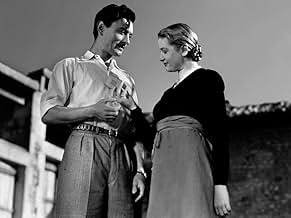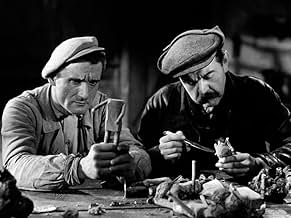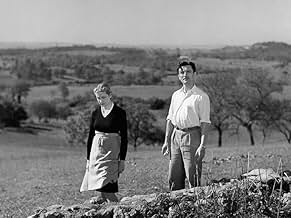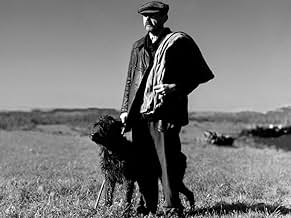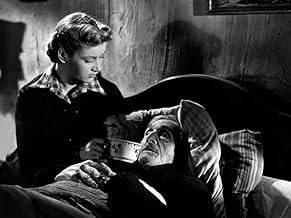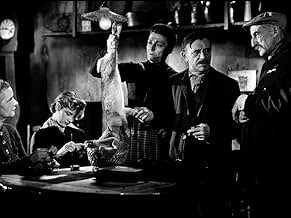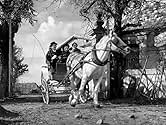CALIFICACIÓN DE IMDb
7.5/10
1.1 k
TU CALIFICACIÓN
Agrega una trama en tu idiomaIn a lost French village, an old woman is killed and her savings stolen. Several members of her family, all called "Goupi", are suspected.In a lost French village, an old woman is killed and her savings stolen. Several members of her family, all called "Goupi", are suspected.In a lost French village, an old woman is killed and her savings stolen. Several members of her family, all called "Goupi", are suspected.
- Dirección
- Guionistas
- Elenco
- Premios
- 1 premio ganado en total
Albert Rémy
- Jean des Goupi
- (as Rémy)
Georges-François Frontec
- Bit Part
- (sin créditos)
Maurice Marceau
- Un porteur à la gare
- (sin créditos)
- Dirección
- Guionistas
- Todo el elenco y el equipo
- Producción, taquilla y más en IMDbPro
Opiniones destacadas
27-year-old Georges Rollin get called back from Paris by his father to their farm/inn, none of which he has seen for 25 years. He doesn't know why, but it turns out his father wants to consolidate the fortune of both branches of the family by marrying him to his cousin Blanchette Brunoy, despite the fact she and another cousin, Robert Vignon are getting it on. On arrival, he's scared out of his wits by an uncle, discovers his great-grandfather's corpse, is accused of murdering an aunt and stealing the mysterious family fortune.
A typical French country family, you'd say, particularly if you're fond of TOBACCO ROAD. Every one of them has a nickname that everyone in the town knows about to exclusion of actually knowing their real names: Goupi Monsieur or Goupi Le Loi or Goupi Mains Gauches and they don't get along particularly well, but unite against outsiders. As the movie went along, it got darker and darker, and I thought director Jacques Becker had made a Clouzot-style picture. Was he trying to get himself banned, too?
Well, you'll have to see how it turns out. It's certainly entertaining, and familiar enough if you come from a large family.
A typical French country family, you'd say, particularly if you're fond of TOBACCO ROAD. Every one of them has a nickname that everyone in the town knows about to exclusion of actually knowing their real names: Goupi Monsieur or Goupi Le Loi or Goupi Mains Gauches and they don't get along particularly well, but unite against outsiders. As the movie went along, it got darker and darker, and I thought director Jacques Becker had made a Clouzot-style picture. Was he trying to get himself banned, too?
Well, you'll have to see how it turns out. It's certainly entertaining, and familiar enough if you come from a large family.
French cinema from the era of the Occupation not surprisingly continues to remain relatively unfamiliar territory, along with French rural life in general. In 1943, however, two major postwar directing talents, Jacques Becker & Henri-Georges Clouzot attracted attention with their second feature films, both rural melodramas as far from Marcel Pagnol as you could get: Becker's 'Goupi Mains Rouge' and Clouzot's 'Le Corbeau'.
Although the opening strongly reminded me of Will Hay arriving at Buggleskelly in 'Oh, Mr. Porter!', what follows is neither as funny, as dramatic - considering that someone gets murdered - or as rural as I had been expecting; with much of the action consisting of talk in the hotel occupied by the grotesque Goupi clan, presided over by the extremely elderly Emperor (played by Maurice Schutz).
As one expects from a Becker film, the acting is consistently good, including the veteran stage actor Fernand Ledoux in the title role, Robert Le Vigan (who ended his days in Argentina after fleeing the fall of Vichy France) as the craziest of the clan, and a young Albert Rémy, best remembered as Antoine Doinel's father in 'Les Quatre Cents Coups'.
I found most of this interesting but strangely uninvolving, and suspect it probably resonates more with a French audience.
Although the opening strongly reminded me of Will Hay arriving at Buggleskelly in 'Oh, Mr. Porter!', what follows is neither as funny, as dramatic - considering that someone gets murdered - or as rural as I had been expecting; with much of the action consisting of talk in the hotel occupied by the grotesque Goupi clan, presided over by the extremely elderly Emperor (played by Maurice Schutz).
As one expects from a Becker film, the acting is consistently good, including the veteran stage actor Fernand Ledoux in the title role, Robert Le Vigan (who ended his days in Argentina after fleeing the fall of Vichy France) as the craziest of the clan, and a young Albert Rémy, best remembered as Antoine Doinel's father in 'Les Quatre Cents Coups'.
I found most of this interesting but strangely uninvolving, and suspect it probably resonates more with a French audience.
Adapted by Pierre Véry from his own novel and directed by Jacques Becker this is a splendidly low key satire on rural life and a highly unflattering portrait of cunning Charentais peasants whose family name is Goupi and whose family values are based upon the making and hoarding of money.
Although verging on the caricature the performances are by a cast that is wonderfully 'true' and whose quality is one that it would be virtually impossible to replicate now, notably Fernand Ledoux as the title character, Arthur Dévere as Goupi-Mes sous and the infamous but brilliant Robert le Vigan as the deranged Goupi-Tonkin.
It is a mixture of murder mystery and black comedy and despite being gloriously subversive for its time, one can only assume that it was spared the same fate that befell the equally subversive 'Le Corbeau' by virtue of the final scene which artfully espouses the Pétainist values of 'Travail, Famille et Patrie'.
This is the third of Becker's thirteen films, the best of which are among the best that French Cinema has to offer and for what it's worth he became one of the few Old Guard directors to be given the seal of approval by the New Ripple brigade.
Although verging on the caricature the performances are by a cast that is wonderfully 'true' and whose quality is one that it would be virtually impossible to replicate now, notably Fernand Ledoux as the title character, Arthur Dévere as Goupi-Mes sous and the infamous but brilliant Robert le Vigan as the deranged Goupi-Tonkin.
It is a mixture of murder mystery and black comedy and despite being gloriously subversive for its time, one can only assume that it was spared the same fate that befell the equally subversive 'Le Corbeau' by virtue of the final scene which artfully espouses the Pétainist values of 'Travail, Famille et Patrie'.
This is the third of Becker's thirteen films, the best of which are among the best that French Cinema has to offer and for what it's worth he became one of the few Old Guard directors to be given the seal of approval by the New Ripple brigade.
For better or worse Jacques Becker is destined to be remembered - at least outside France - for Casque d'Or and whilst this is not bad as memorials go it's a pity that some of his other work such as Touchez pas au grisbi and this one are not better known and/or perhaps do not travel quite so well. Marcel Pagnol has a lot to answer for but not all of it is bad. He wrote the Book as far as French Provincials are concerned and if imitation really is the sincerest form of flattery then he will be a happy bunny and smiling down benignly on the likes of Les Enfants du Marais, etc. Of course in 1943 he could have looked Becker in the eye and laid a broad smile on him for he was still very much with us and it is interesting to speculate on what he would have made of this entry in which, in no particular order, Lust, Avarice and Murder, shuffle to center stage, take a bow and exit pursued by a cliche. Becker returned to the group-as-microcosm plot time and again and often - Touchez pas au grisbi, Casque d'Or, Le Trou - the group was the Underworld, but here it is our old friend the 'extended' family. Deep in Charente - though it could be anywhere where trees outnumber people -live the Clan Goupi, each one complete with his or her nickname and like families everywhere they have their own internicine digs. But what's a group situation without a catalyst so enter Eugene Goupi, fresh from Paris - his mother had fled the claustrophobic atmosphere when he was a mere tot so he has never seen his 'family - and enter Murder most foul and missing treasure and green-eyed monsters all contributing to a rich bouillabaise that stirs rather than shakes the viewer. Some sixty years later the actors, to a man, are virtually forgotten but they live on in this bizarrely-patterned yet ultimately warm patchwork quilt. 8/10
This is Jacques Becker's second effort and the first one that really counts.Along with "casque d'or" ,"rendez-vous de juillet" and "le trou",it may be his finest work,and for sure one of the classics of the French cinema,one of these that you can watch and watch again without being tired.
The scenarist Pierre Very,is,along with Boileau-Narcejac,the best French suspense writer,and he outdoes himself here,creating an absorbing plot,a magic atmosphere,and a dozen of colorful characters .Out in the sticks,lives the Goupi family:actually a clan who's got its own laws and in which strangers are looked upon pretty much as enemies.In this strange family,every member has got a nickname,each one of them beginning with Goupi:Goupi-mes-sous,Goupi-Muguet,Goupi-Tonkin,of course Goupi-mains -rouges (Goupi-red-hands),and more.One fine day,a young man arrives from Paris :this is the first time he has come in this lost country,to visit his family.His late mother had escaped the Goupi clan,being unable to stand this place cut off the world.Needless to say,coming from the City,he's not welcome.The plot thickens when a Goupi wicked woman is murdered and the patriarch has a stroke and is no longer able to indicate where the family pile is hidden.
Jacques Becker created a very strange atmosphere,mainly during the first part:when the young man arrives ,he's taken by his uncle Goupi-Mains-Rouges to a scary place full of stuffed animals and black magic. He has wonderfully depicted his peasant milieu,in which they all stand together ,and in which they would not betray one of them,even if the police investigates their home.
There is a first-class cast,including Fernand ledoux,Georges Rollin,Germaine Kerjean and Blanchette Brunoy ;but the stand out is Robert Le Vigan,who portrays a former legionnaire,slipping gradually into madness.The most famous scene of the film belongs to him:pursued by the police,he climbs upon a tree,higher and higher,trying to reach for this sun he used to know when he was a soldier in the Colonies.A similar character is featured in Becker's follow-up movie "Falbalas",but insanity is much more credible in "Goupi Mains Rouges".
Had Hitchcock directed a country thriller,that would have been this one.
The scenarist Pierre Very,is,along with Boileau-Narcejac,the best French suspense writer,and he outdoes himself here,creating an absorbing plot,a magic atmosphere,and a dozen of colorful characters .Out in the sticks,lives the Goupi family:actually a clan who's got its own laws and in which strangers are looked upon pretty much as enemies.In this strange family,every member has got a nickname,each one of them beginning with Goupi:Goupi-mes-sous,Goupi-Muguet,Goupi-Tonkin,of course Goupi-mains -rouges (Goupi-red-hands),and more.One fine day,a young man arrives from Paris :this is the first time he has come in this lost country,to visit his family.His late mother had escaped the Goupi clan,being unable to stand this place cut off the world.Needless to say,coming from the City,he's not welcome.The plot thickens when a Goupi wicked woman is murdered and the patriarch has a stroke and is no longer able to indicate where the family pile is hidden.
Jacques Becker created a very strange atmosphere,mainly during the first part:when the young man arrives ,he's taken by his uncle Goupi-Mains-Rouges to a scary place full of stuffed animals and black magic. He has wonderfully depicted his peasant milieu,in which they all stand together ,and in which they would not betray one of them,even if the police investigates their home.
There is a first-class cast,including Fernand ledoux,Georges Rollin,Germaine Kerjean and Blanchette Brunoy ;but the stand out is Robert Le Vigan,who portrays a former legionnaire,slipping gradually into madness.The most famous scene of the film belongs to him:pursued by the police,he climbs upon a tree,higher and higher,trying to reach for this sun he used to know when he was a soldier in the Colonies.A similar character is featured in Becker's follow-up movie "Falbalas",but insanity is much more credible in "Goupi Mains Rouges".
Had Hitchcock directed a country thriller,that would have been this one.
¿Sabías que…?
- TriviaAward: Grand Prix du Cinéma Français 1943.
- ConexionesFeatured in Viaje por el cine francés (2016)
Selecciones populares
Inicia sesión para calificar y agrega a la lista de videos para obtener recomendaciones personalizadas
- How long is It Happened at the Inn?Con tecnología de Alexa
Detalles
- Fecha de lanzamiento
- País de origen
- Idioma
- También se conoce como
- It Happened at the Inn
- Locaciones de filmación
- Charente, Francia(Exterior)
- Productora
- Ver más créditos de la compañía en IMDbPro
- Tiempo de ejecución
- 1h 44min(104 min)
- Color
- Relación de aspecto
- 1.37 : 1
Contribuir a esta página
Sugiere una edición o agrega el contenido que falta

